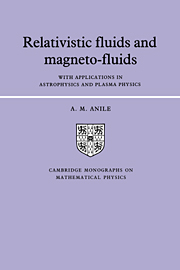Book contents
- Frontmatter
- Contents
- Preface
- 1 Introduction
- 2 Mathematical structure
- 3 Singular hypersurfaces in space-time
- 4 Propagation of weak discontinuities
- 5 Relativistic simple waves
- 6 Relativistic geometrical optics
- 7 Relativistic asymptotic waves
- 8 Relativistic shock waves
- 9 Propagation of relativistic shock waves
- 10 Stability of relativistic shock waves
- References
- Index
8 - Relativistic shock waves
Published online by Cambridge University Press: 06 January 2010
- Frontmatter
- Contents
- Preface
- 1 Introduction
- 2 Mathematical structure
- 3 Singular hypersurfaces in space-time
- 4 Propagation of weak discontinuities
- 5 Relativistic simple waves
- 6 Relativistic geometrical optics
- 7 Relativistic asymptotic waves
- 8 Relativistic shock waves
- 9 Propagation of relativistic shock waves
- 10 Stability of relativistic shock waves
- References
- Index
Summary
Introduction
From the results of the previous chapters we have seen that, under suitable assumptions (the compressibility hypothesis) a relativistic compressive nonlinear acoustic or magnetoacoustic pulse steepens and degenerates into a shock wave. Therefore, shocks are common occurrences in nonlinear wave motion and this chapter is devoted to laying out the basic theory of relativistic shock waves. Relativistic shocks are a very important feature in several models of phenomena occurring in astrophysics, plasma physics, and nuclear physics and in the following we shall briefly touch upon some examples.
Supernovas represent one of the most fierce phenomena occurring in the universe. A star suddenly increases its luminosity by many orders of magnitude such that at its maximum its light can outshine the total light from its parent galaxy. This phenomenon is suggestive of an explosion taking place in the star. Several mechanisms have been proposed in order to explain the source of energy driving the explosion (Carbon detonation, neutrino energy deposition, gravitational collapse and bounce, etc.).
In the case of massive stars, in the range between 8 and 100 solar masses, which are thought to be progenitors of type II supernovas, one of the most viable mechanisms for producing an explosion is gravitational collapse and bounce (Van Riper, 1979). At the end of stellar evolution the star will develop a core composed mainly of nuclei near the iron peak and free electrons, with a mass close to the Chandrasekhar limit of about 1.4 solar masses.
- Type
- Chapter
- Information
- Relativistic Fluids and Magneto-fluidsWith Applications in Astrophysics and Plasma Physics, pp. 211 - 275Publisher: Cambridge University PressPrint publication year: 1990

